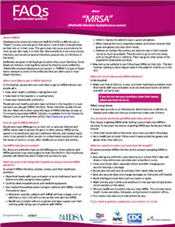Prevention of the spread of MRSA
This page describes key practices and includes relevant tools and educational materials to assist clinicians in their efforts to prevent MRSA infection and spread. If an outbreak is happening or has occurred, please contact your facility’s infection prevention or your local/state health department.
Patient / Visitor Education
Patient education is a critical component of MRSA case management. Healthcare professionals should educate patients and visitors on methods to avoid MRSA transmission to close contacts.

CDC Guidelines
Standard Precautions, excerpted from the Guideline for Isolation Precautions, should be used for all patient care. In addition, CDC recommends contact and other precautions for MRSA. If adherence to these combined strategies does not reduce MRSA infection rates and spread to desired levels, there are several other recommended strategies to assist clinicians in their efforts to protect patients from MRSA. Further recommendations can be found in these guidelines:
- Environmental Cleaning and Disinfection
- Management of Multidrug-Resistant Organisms in Healthcare Settings, 2006 [PDF – 235KB/73 pages].
Prevention Tools
MRSA Prevention Toolkit
- Methicillin-resistant Staphylococcus aureus (MRSA) Infections [PDF – 206 KB]
MRSA Toolkit [PPT – 744 KB]
Evaluating Environmental Cleaning
- Options for Evaluating Environmental Cleaning [PDF – 389 KB]
- CDC Environmental Checklist for Monitoring Terminal Cleaning [PDF – 99KB]
- CDC Environmental Checklist [Word – 52 KB]
- Environmental Cleaning Eval Worksheet [Excel – 63 KB]
Obtaining Cultures
In general, a culture should be obtained to guide treatment of infections. If S. aureus is isolated, susceptibility testing should be performed according to national standards. More lab information can be found here.
Reporting MRSA to State Health Departments
MRSA is reportable in several states. The decision to make a particular disease reportable to public health authorities is made by each state, based on the needs of that individual state. To find out if MRSA is reportable in your state, contact your state health department. Note that most states have requirements to report outbreaks of any communicable disease.
- Page last reviewed: February 4, 2016
- Page last updated: March 15, 2016
- Content Source:


 ShareCompartir
ShareCompartir